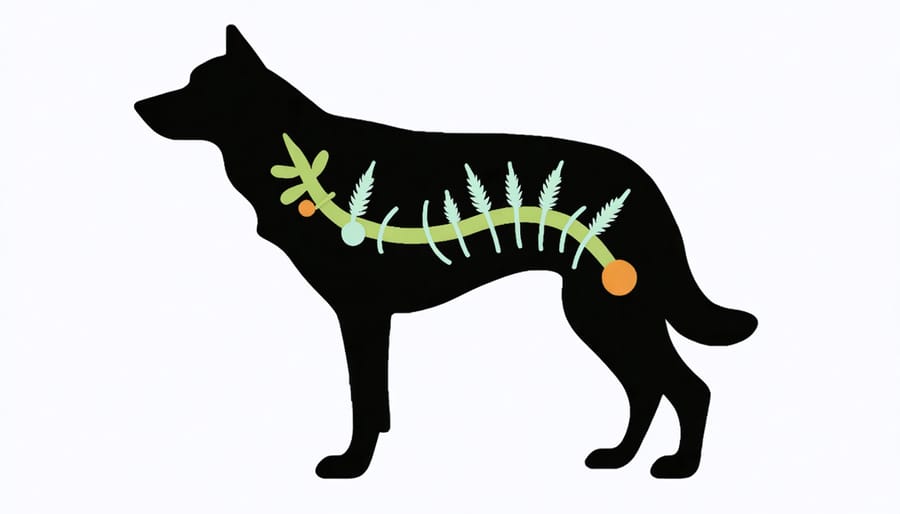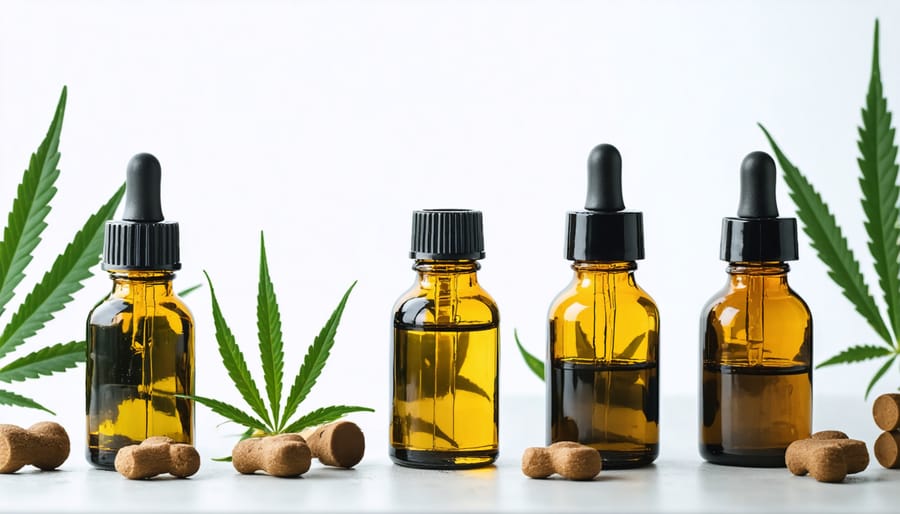As more pet owners seek natural wellness solutions, CBD has emerged as a promising option for supporting animal health. Just like Amanita gummies have gained popularity among humans, CBD products specially formulated for pets are revolutionizing companion animal care. From easing joint discomfort in aging dogs to calming anxious cats during thunderstorms, CBD’s potential benefits for pets have captured the attention of both veterinarians and devoted pet parents. While research is still emerging, many pet owners report remarkable improvements in their furry friends’ quality of life after introducing CBD supplements. This guide explores the science behind CBD for pets, proper dosing guidelines, and how to safely incorporate these products into your pet’s wellness routine – always with veterinary guidance as the cornerstone of responsible use.
How CBD Works in Your Pet’s Body

The Science Made Simple
Just like humans, our pets have a complex system in their bodies called the endocannabinoid system (ECS). This natural network helps maintain balance in various functions, from mood and sleep to pain and inflammation. CBD works by interacting with this system, supporting our furry friends’ overall wellness.
When your pet consumes CBD, it connects with special receptors throughout their body. Think of these receptors as tiny locks, and CBD as a key that helps unlock natural healing responses. This interaction can help calm anxious pets, ease joint discomfort, and support healthy sleep patterns.
What makes CBD particularly special is that it’s gentle on your pet’s system. Unlike some medications, CBD doesn’t overwhelm the body’s natural processes – it simply helps enhance what’s already there. This explains why many pet parents report positive changes in their companions without concerning side effects.
Understanding this science helps explain why CBD can be so beneficial for our pets’ wellbeing, though every animal responds differently.
CBD vs. THC: Important Differences for Pet Safety
While both CBD and THC come from cannabis plants, they affect pets very differently. CBD is a non-psychoactive compound that can offer various wellness benefits for our furry friends when properly administered. THC, on the other hand, is toxic to pets and can cause severe reactions, including disorientation, balance problems, and even seizures.
That’s why it’s crucial to choose pet CBD products carefully and follow proper pet safety precautions. Always ensure you’re using CBD products specifically formulated for pets that contain zero or legally permitted trace amounts of THC (less than 0.3%). These products should come with third-party lab tests confirming their THC-free status.
Remember, your pet’s safety is paramount. If you suspect your pet has been exposed to THC-containing products, contact your veterinarian immediately. When used correctly, CBD can be a wonderful wellness tool for pets, but THC should always be kept far away from our four-legged family members.
Potential Benefits for Your Pet
Comfort and Mobility Support
As our beloved pets age, they often face challenges with mobility and joint discomfort. CBD has shown promising potential in supporting aging pets’ comfort and activity levels, helping them maintain their quality of life. Many pet parents report that their senior dogs and cats seem more willing to play and engage in daily activities after incorporating CBD into their wellness routine. The natural anti-inflammatory properties of CBD may help ease joint stiffness, while its calming effects can help pets feel more relaxed during movement. Whether it’s helping an older dog enjoy their daily walk or enabling a senior cat to jump onto their favorite perch, CBD can be a gentle support tool for keeping our aging companions mobile and comfortable. Always start with small doses and monitor your pet’s response, adjusting as needed under veterinary guidance.

Maintaining Calm and Balance
Many pet parents know the challenges of caring for sensitive pets who struggle with anxiety, stress during thunderstorms, or nervousness in new situations. CBD has shown promise in helping pets maintain a sense of calm and emotional balance. Through its interaction with the endocannabinoid system, CBD may help reduce anxiety-related behaviors without causing sedation. Pet owners often report that their furry friends seem more relaxed during car rides, veterinary visits, or when meeting new people. While every pet responds differently, CBD can be a gentle support tool when used as part of a comprehensive approach to pet wellness. Always start with small amounts and observe your pet’s response, consulting with your veterinarian to determine the best approach for your companion’s specific needs.
General Wellness Support
Many pet parents report improvements in their furry friends’ overall quality of life when using CBD as part of their wellness routine. From increased playfulness in senior pets to better sleep patterns, the benefits can be wide-ranging. Pet owners often notice their companions seem more relaxed during stressful situations like thunderstorms or travel. Some report their pets have improved appetite and maintaining a healthy weight becomes easier. Regular CBD use may also support skin health, leading to less scratching and a shinier coat. While these benefits are encouraging, remember that every pet is unique, and results can vary. Always start with small amounts and monitor your pet’s response to find what works best for their individual needs.
Choosing Safe CBD Products for Your Pet
Quality Indicators to Look For
When shopping for CBD products for your beloved pets, there are several key quality indicators to keep in mind. First, look for products that have been third-party tested, with lab results readily available. These tests confirm the CBD content and ensure the product is free from harmful contaminants.
Choose products made specifically for pets rather than human CBD products. Pet-specific formulations are designed with appropriate concentrations and ingredients safe for animal consumption. Check the ingredient list carefully – a high-quality product should contain natural ingredients without artificial additives or preservatives.
The extraction method matters too. Look for CBD extracted using CO2 or ethanol methods, as these tend to be the cleanest and safest. The product should clearly state the amount of CBD per serving and provide detailed dosing instructions based on your pet’s weight.
Organic hemp source is another important factor. Hemp plants can absorb toxins from soil, so choosing organic reduces the risk of contamination. Finally, reputable manufacturers will provide clear contact information and responsive customer service to address any concerns about their products.

Forms and Administration Methods
CBD products for pets come in several pet-friendly forms, making it easier to find an option that works best for your furry friend. Oil tinctures are among the most popular choices, as they allow for precise dosing and can be added directly to your pet’s food or dropped onto treats. These oils typically come with a dropper for easy administration.
Treats infused with CBD offer a convenient and enjoyable way to give CBD to pets who might be picky about taking supplements. Available in various flavors and textures, these treats can make the experience more pleasant for your pet.
For pets with skin issues or joint pain, topical CBD products like balms and creams can be applied directly to problem areas. These products are particularly useful for localized relief and are easy to massage into your pet’s skin or paw pads.
Capsules provide another option for consistent dosing, especially for larger pets or those requiring specific amounts. These can be hidden in treats or given with food. Some companies also offer CBD-infused pet shampoos and sprays for external applications.
Remember to start with small amounts and observe your pet’s response before adjusting the dose.
Starting Slowly: Finding the Right Amount
When introducing CBD to your furry friend, it’s essential to start with a conservative approach, just like with new puppy care. Begin with the lowest recommended dosage and observe your pet’s response over several days. A general rule of thumb is 1-2mg of CBD per 10 pounds of body weight, but always consult your veterinarian for personalized guidance. Watch for signs that your pet is comfortable with the current dosage, such as improved mobility or reduced anxiety, before considering any adjustments. Keep a daily log of when you administer CBD and note any changes in your pet’s behavior or well-being. This careful approach helps ensure your pet receives the optimal benefits while maintaining their safety and comfort.
Working With Your Veterinarian
When it comes to using CBD for your furry family member, partnering with your veterinarian is essential for a safe and effective experience. Your vet knows your pet’s complete medical history, current medications, and specific health concerns, making them the best resource for personalized guidance.
Start by scheduling a consultation to discuss your interest in CBD. Many pet parents are pleasantly surprised to find that modern veterinarians are increasingly knowledgeable about CBD and open to discussing its potential benefits. During your visit, be prepared to share why you’re considering CBD for your pet and any specific concerns you’d like to address.
Your veterinarian can help determine if CBD is appropriate for your pet’s condition, recommend proper dosing, and suggest reputable products. They’ll also monitor your pet’s progress and make any necessary adjustments to ensure the best possible outcomes. This professional oversight is particularly important if your pet takes other medications, as CBD can interact with certain drugs.
Keep a journal of your pet’s response to CBD, including any changes in behavior or symptoms, and share these observations with your vet during follow-up visits. This information helps create a tailored approach to your pet’s wellness journey.
Remember that while CBD shows promise for many pet health issues, it’s just one tool in your pet’s overall wellness toolkit. Working closely with your veterinarian ensures that CBD is properly integrated into your pet’s comprehensive health care plan, maximizing its benefits while maintaining safety.
As we’ve explored throughout this article, CBD offers promising potential benefits for our beloved pets’ health and wellness. From managing anxiety and chronic pain to supporting mobility in senior pets, CBD products can be a valuable addition to your pet’s care routine when used responsibly and under proper guidance.
Remember to always start with high-quality, pet-specific CBD products, begin with the lowest recommended dosage, and monitor your pet’s response carefully. While CBD shows great promise, it’s not a miracle cure, and what works for one pet may not work for another.
Most importantly, never begin a CBD regimen without first consulting your veterinarian, especially if your pet has existing health conditions or takes other medications. Your vet can help create a tailored plan that best serves your pet’s individual needs.
By approaching CBD use thoughtfully and staying informed about the latest research and recommendations, you can make the best decisions for your furry family member’s health and happiness. Together with proper veterinary care, nutrition, and love, CBD can be part of a comprehensive approach to supporting your pet’s overall wellness.



